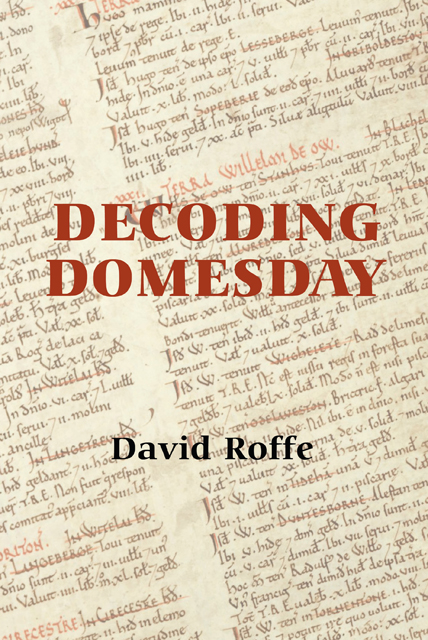Book contents
- Frontmatter
- Contents
- Tables
- Dedication
- Preface
- Acknowledgements
- Abbreviations
- 1 Domesday Past and Present
- 2 The Domesday Texts
- 3 The Inquest and the Book
- 4 The Domesday Boroughs
- 5 Lordship, Land, and Service
- 6 The Vill and Taxation
- 7 The Economy and Society
- 8 The Communities of the Shire
- 9 The Beyond of Domesday
- 10 Domesday Now
- Appendix The main entry forms of GDB
- Bibliography
- Index
Preface
Published online by Cambridge University Press: 10 March 2023
- Frontmatter
- Contents
- Tables
- Dedication
- Preface
- Acknowledgements
- Abbreviations
- 1 Domesday Past and Present
- 2 The Domesday Texts
- 3 The Inquest and the Book
- 4 The Domesday Boroughs
- 5 Lordship, Land, and Service
- 6 The Vill and Taxation
- 7 The Economy and Society
- 8 The Communities of the Shire
- 9 The Beyond of Domesday
- 10 Domesday Now
- Appendix The main entry forms of GDB
- Bibliography
- Index
Summary
In Domesday: the Inquest and the Book (DIB) I challenged a consensus of 800 years standing that the production of Domesday Book was the aim of the Domesday inquest. Through a radical re-examination of the Domesday texts and the nature of the inquest, I argued that the inquiry of 1086 was a different enterprise from that of the book, the one being a communal information gathering exercise, the other a private administrative process. As is the way of the modern world, a complex argument was soon translated into tabloid terms: ‘It was Bill Wot Didn't Do it!’ In what was little more than an aside, I had tentatively suggested that the aftermath of the revolt against William Rufus in 1088 was a possible context for the production of the book and that Rannulf Flambard, the Peter Mandelson of his day, was the probable moving spirit behind it. The sometimes furious debate that followed publication in 2000 concentrated almost exclusively on the date of Domesday Book.
The debate goes on; I contribute a further pennyworth myself in the discussion of the date of Domesday Book below. The point, however, is subordinate to a much wider and important one. Of none of the inquests of the later Middle Ages is it possible to say that it had a purpose; articles of enquiry were always diverse, were often changed, and not infrequently abandoned for completely new ones as the participants responded to circumstances. It is clear from contemporary accounts and the surviving texts that the Domesday inquest was no different. Domesday Book was undoubtedly conceived as a register of one kind or another, but, regardless of its date – whether it be 1086–7 or later – its concerns were not necessarily those of the process that gathered the data. My examination of the documentation of the inquest led me to suggest that its subjects were indeed otherwise. They were broadly two. The first was a drive to maximize royal income as manifest in an audit of the king's estates and regalia, most notably a review of the geld. The second was a reassessment of the military service owed by the tenants-in-chief.
- Type
- Chapter
- Information
- Decoding Domesday , pp. xi - xivPublisher: Boydell & BrewerPrint publication year: 2015



